Sample Referral Letter To Specialist
[Your Name]
[Your Title/Position]
[Your Contact Information]
[Date]
[Specialist's Name]
[Specialist's Title]
[Specialist's Clinic/Hospital]
[Specialist's Address]
Dear Dr. [Specialist's Last Name],
I hope this letter finds you well. I am writing to refer one of my patients, [Patient's Name], to your esteemed expertise and care. I believe that your specialized knowledge and skills will be instrumental in providing [Patient's Name] with the best possible medical attention.
[Patient's Name] is a [Age]-year-old [Gender] who has been under my care for the past [Duration] for [Brief Description of Patient's Condition/Diagnosis]. Despite the comprehensive treatment plan we have implemented, there have been [mention any challenges, complications, or lack of progress].
Given your extensive experience in [Specialist's Area], I am confident that your assessment and recommendations will greatly benefit [Patient's Name]'s overall health and well-being. I kindly request your assistance in further evaluating [Patient's Name]'s condition and developing a tailored treatment plan.
Enclosed with this letter are [relevant medical reports, test results, imaging, or any other pertinent information you're providing]. This should aid in your evaluation of [Patient's Name]'s medical history and current status.
I kindly request that you keep me informed about [Patient's Name]'s progress and any recommended treatments or interventions. I believe that a collaborative approach will lead to the best possible outcomes for [Patient's Name].
Please feel free to contact me at [Your Phone Number] or [Your Email Address] if you require any additional information or if you have any questions regarding [Patient's Name]'s case.
Thank you for your attention to this matter, and I look forward to your expert guidance in managing [Patient's Name]'s condition.
Sincerely,
[Your Signature]
[Your Typed Name]
[Your Title/Position]
[Your Clinic/Hospital Name]
[Your Clinic/Hospital Address]
[Your Contact Information]
Formal Referral Letter to Specialist
Subject: Referral for Specialist Consultation
Dear Dr. [Specialist’s Name],
I am referring my patient, [Patient Name], age [Patient Age], to your care for further evaluation and management of [specific condition]. The patient has been under my care since [Date], and despite standard treatment, the symptoms persist.
Enclosed are the relevant medical records, lab results, and imaging reports for your review. I trust your expertise will provide advanced assessment and recommendations for optimal management.
Please advise on the next steps and feel free to contact me for any additional information.
Sincerely,
[Your Name]
[Medical Practice / Clinic Name]
Casual Referral Email to Specialist
Subject: Patient Referral – [Patient Name]
Hi Dr. [Specialist’s Name],
I am sending you [Patient Name], who has been experiencing [brief description of symptoms]. I believe your specialist expertise in [Specialty] would greatly benefit the patient’s diagnosis and treatment.
Attached are the patient’s records and test results. Please let me know if you require any further information.
Thank you for your assistance.
Best regards,
[Your Name]
Urgent Referral Letter for Critical Condition
Subject: Urgent Referral for Immediate Specialist Attention
Dear Dr. [Specialist’s Name],
I am urgently referring my patient, [Patient Name], for immediate evaluation due to [critical condition]. The patient presented with [symptoms] on [Date] and requires specialized intervention to prevent further complications.
All recent labs, imaging, and clinical notes are attached for your immediate review. Your prompt attention and guidance on urgent management are highly appreciated.
Sincerely,
[Your Name]
[Medical Practice / Clinic Name]
Referral Letter for Routine Specialist Check-Up
Subject: Referral for Specialist Evaluation
Dear Dr. [Specialist’s Name],
I am referring my patient, [Patient Name], for a routine specialist evaluation of [condition]. The patient has shown [mild/early] symptoms and it is advisable to have a specialist assessment.
Enclosed are relevant patient history and lab results. I would appreciate your evaluation and recommendations for further management.
Thank you for your cooperation.
Sincerely,
[Your Name]
Referral Letter for Pediatric Specialist
Subject: Pediatric Referral – [Patient Name]
Dear Dr. [Specialist’s Name],
I am referring my pediatric patient, [Patient Name], age [Patient Age], for evaluation of [specific condition]. The child has been under my care since [Date] and requires specialized attention in [Specialty].
Attached are the patient’s medical records, growth charts, and laboratory reports. Your expertise in managing pediatric cases of this nature will be greatly appreciated.
Sincerely,
[Your Name]
Heartfelt Referral Letter for Chronic Condition
Subject: Referral for Specialist Consultation – Chronic Condition
Dear Dr. [Specialist’s Name],
I am referring my patient, [Patient Name], who has been managing [chronic condition] for the past [duration]. Despite ongoing treatment, the patient continues to experience [specific symptoms].
Your specialized expertise could provide valuable guidance and improve the patient’s quality of life. I have attached all relevant records and test results. Thank you for your time and care.
Sincerely,
[Your Name]
Referral Letter for Diagnostic Evaluation
Subject: Referral for Diagnostic Assessment
Dear Dr. [Specialist’s Name],
I am referring my patient, [Patient Name], for diagnostic evaluation of [condition or symptom]. Preliminary tests suggest [findings], and I believe your assessment is essential to determine a definitive diagnosis.
Enclosed are all relevant laboratory reports and imaging studies. Please advise on recommended next steps and any additional investigations you deem necessary.
Thank you for your assistance.
Sincerely,
[Your Name]
Referral Letter for Second Opinion
Subject: Request for Second Opinion
Dear Dr. [Specialist’s Name],
I am referring my patient, [Patient Name], for a second opinion regarding [diagnosis or treatment plan]. The patient has been under my care since [Date] and has completed initial treatment of [specific details].
Attached are the patient’s complete medical records for your review. Your expert opinion on further management would be greatly appreciated.
Sincerely,
[Your Name]
Referral Letter for Surgical Consultation
Subject: Referral for Surgical Evaluation
Dear Dr. [Specialist’s Name],
I am referring my patient, [Patient Name], for a surgical consultation regarding [condition]. Non-invasive treatments have been attempted, but the patient requires evaluation for potential surgical intervention.
Attached are imaging studies, lab reports, and clinical notes. Your assessment and recommendations for surgical management are requested.
Thank you for your attention to this case.
Sincerely,
[Your Name]
What is a Sample Referral Letter to Specialist and Why Is It Important?
A referral letter to a specialist is a formal communication from a primary care provider or general practitioner to a specialist physician.
It is important because:
- It provides detailed patient information for accurate diagnosis and treatment.
- Ensures continuity of care between healthcare providers.
- Helps specialists understand patient history, previous treatments, and tests.
Who Should Send a Referral Letter to a Specialist?
- Primary care physicians or general practitioners.
- Family doctors managing a patient’s general health.
- Pediatricians referring children to specialized care.
- Any healthcare provider identifying the need for specialized medical attention.
To Whom Should a Referral Letter Be Addressed?
- Specialist physicians relevant to the patient’s condition.
- Sub-specialists for specific health issues (e.g., cardiologist, neurologist).
- Hospital departments or clinics handling specialist consultations.
When Should a Referral Letter Be Written?
- When initial treatment or diagnosis requires specialized evaluation.
- For chronic or complex conditions unresponsive to general care.
- For surgical or advanced diagnostic evaluation.
- When patients request a second opinion from a specialist.
How to Write a Professional Referral Letter to a Specialist
- Begin with a clear subject indicating referral purpose.
- Introduce the patient with name, age, and brief medical history.
- Describe the condition, symptoms, and prior treatments.
- Attach relevant records, lab reports, and imaging studies.
- Close with a professional note requesting evaluation and guidance.
Requirements and Preparations Before Writing the Referral Letter
- Collect complete patient history and medical records.
- Verify the specialist’s contact information and area of expertise.
- Ensure any recent test results or imaging reports are available.
- Confirm patient consent to share medical information with the specialist.
Formatting and Style Guidelines for Referral Letters
- Keep the letter concise yet detailed, usually one page.
- Use a formal and professional tone.
- Include attachments clearly labeled for reference.
- Address the letter directly to the specialist by name and title.
- Use secure modes for sending: physical mail, hospital portal, or encrypted email.
After Sending the Referral Letter: Follow-Up Steps
- Confirm receipt of the letter with the specialist’s office.
- Maintain communication regarding appointment scheduling or additional information.
- Document the referral in the patient’s medical records.
- Follow up for feedback or recommendations after the specialist consultation.
Pros and Cons of Sending a Referral Letter
Pros:
- Provides clear communication and continuity of care.
- Reduces errors by supplying complete patient information.
- Builds professional collaboration between healthcare providers.
Cons:
- Time-consuming to compile comprehensive records.
- Risk of delay if the specialist is unavailable.
- Requires careful handling of sensitive patient information.
Common Mistakes to Avoid When Writing a Referral Letter
- Omitting important medical history or lab results.
- Using vague descriptions of symptoms or prior treatments.
- Failing to include specialist’s name or proper contact details.
- Not obtaining patient consent for referral.
- Sending unorganized attachments or incomplete documentation.
Key Elements and Structure of a Referral Letter
- Subject line indicating purpose of referral.
- Patient introduction: name, age, brief history.
- Medical condition and reason for referral.
- Summary of previous treatments, medications, and test results.
- Attachments and supporting documents.
- Closing with request for evaluation and professional courtesy.
Tricks and Tips for Writing Effective Referral Letters
- Use bullet points for lab results or medications for clarity.
- Attach summaries rather than full-length reports if too lengthy.
- Personalize the letter for the specialist’s area of expertise.
- Double-check patient identifiers and contact information.
- Maintain confidentiality and use secure communication channels.
FAQ About Referral Letters to Specialists
Q: Is patient consent necessary before sending a referral letter?
A: Yes, always obtain patient consent to share medical information.
Q: Can a referral be sent electronically?
A: Yes, secure email or hospital portals are commonly used.
Q: What should be included in attachments?
A: Recent test results, imaging, lab reports, and relevant medical history.

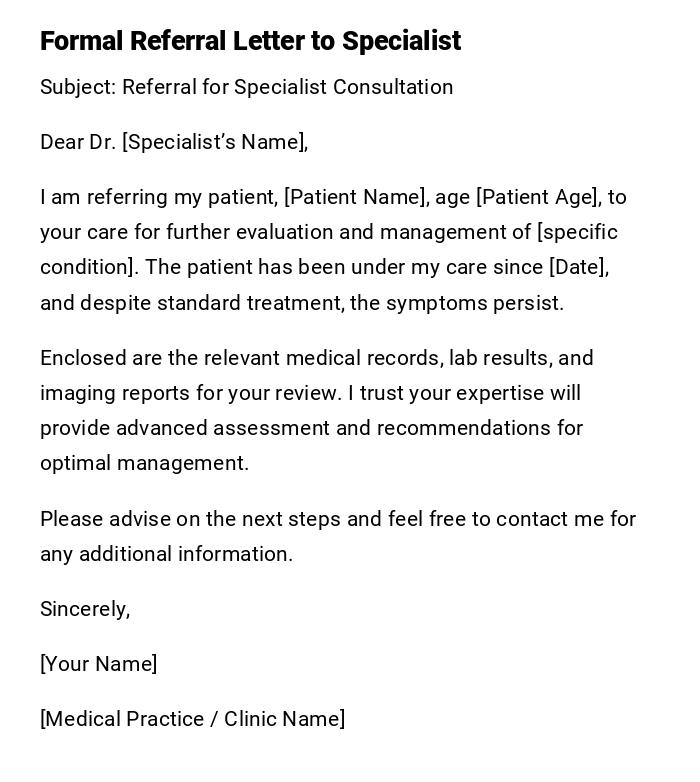
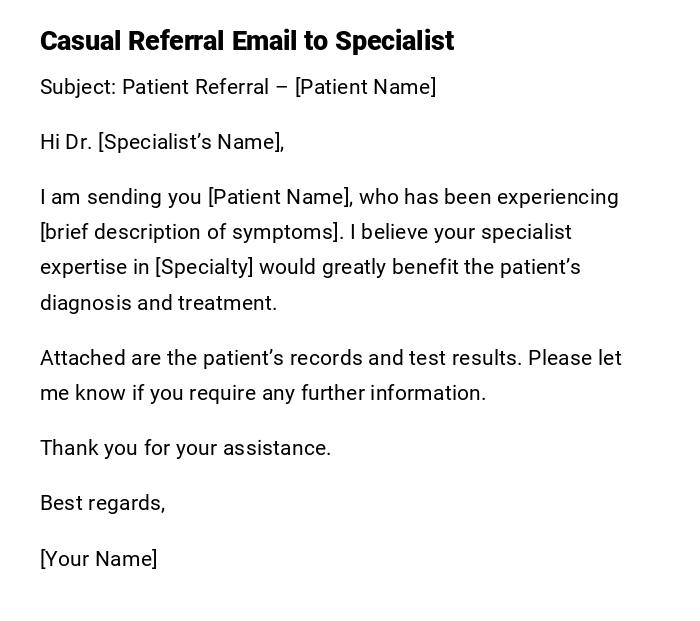
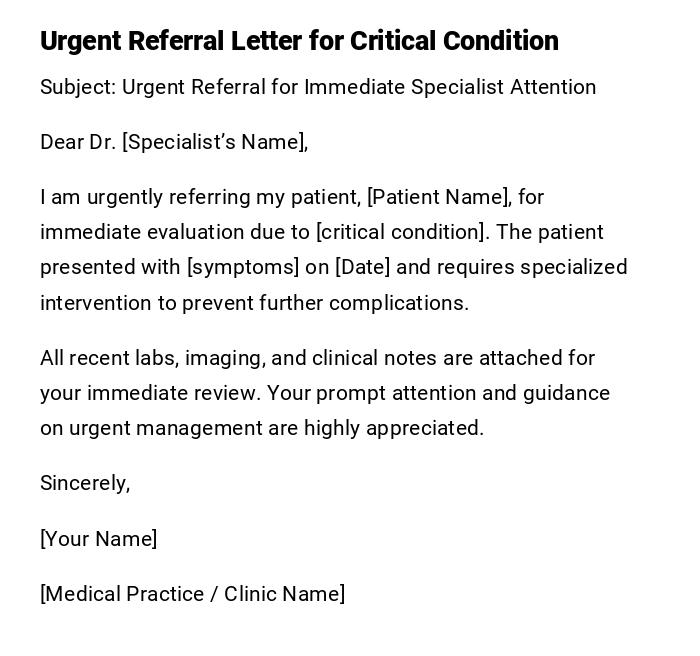
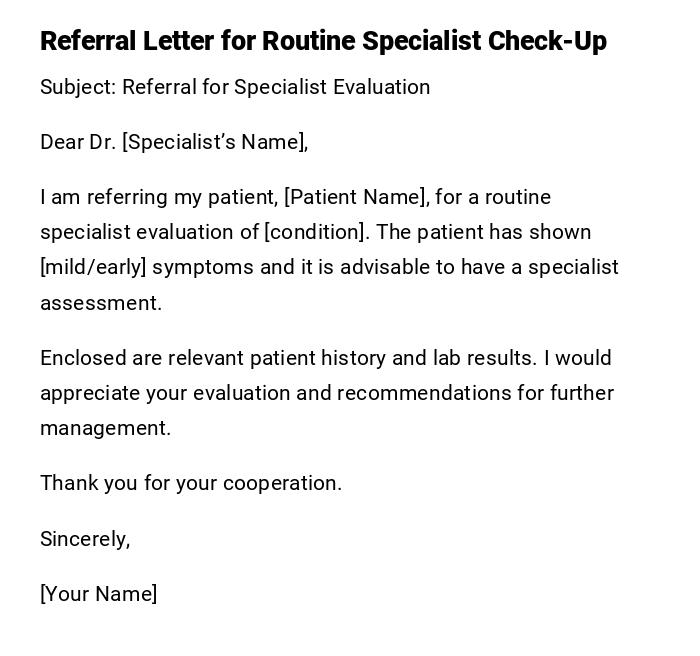
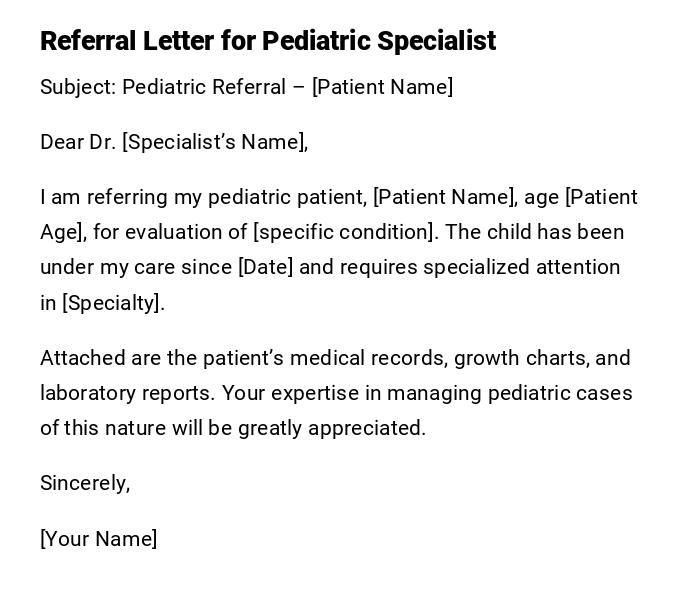
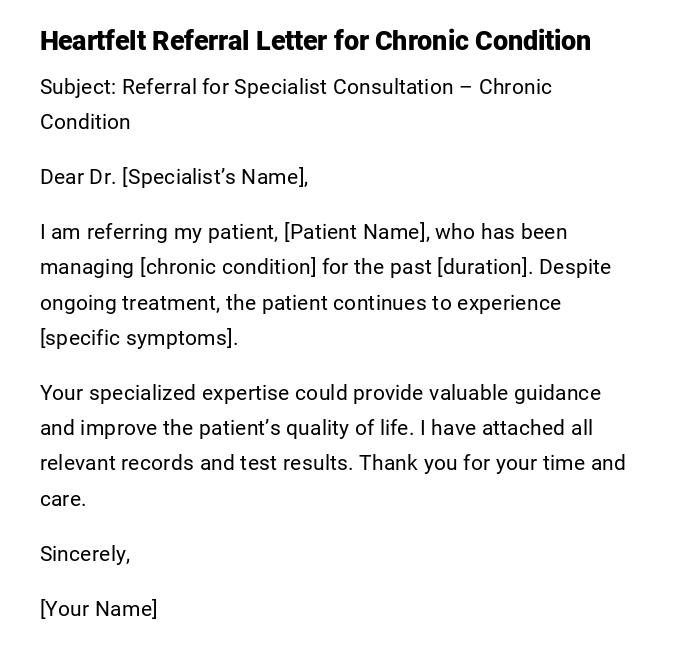
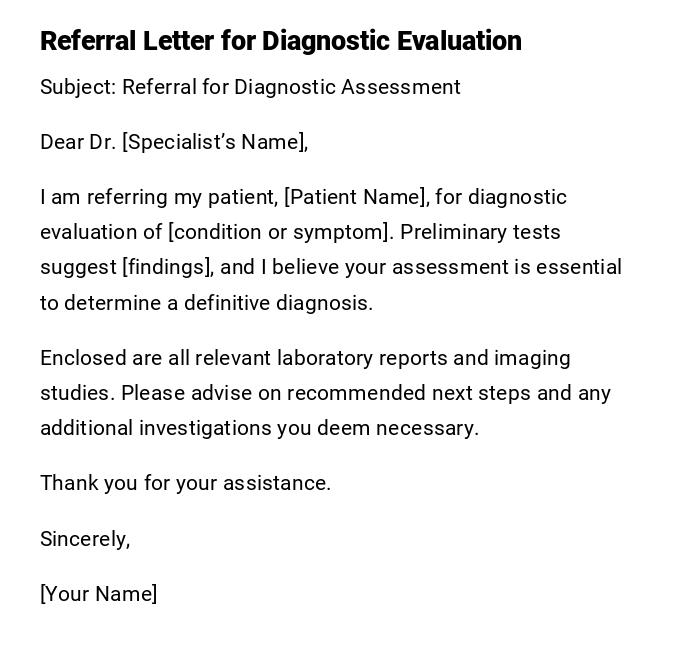
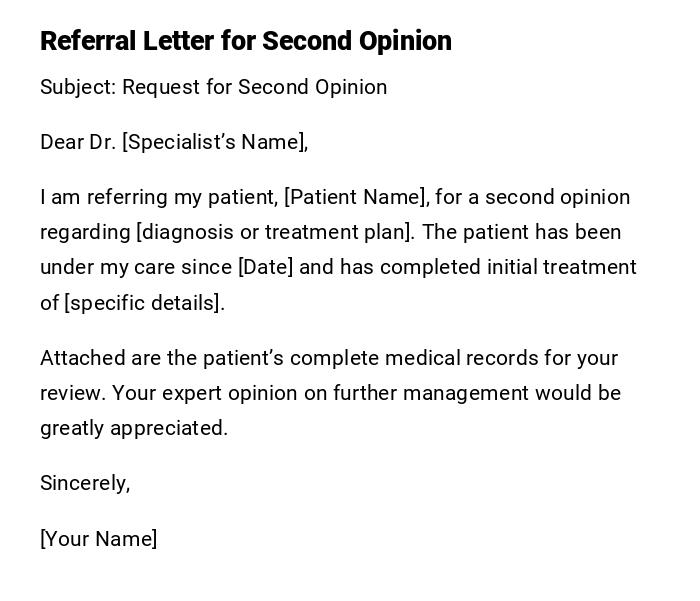
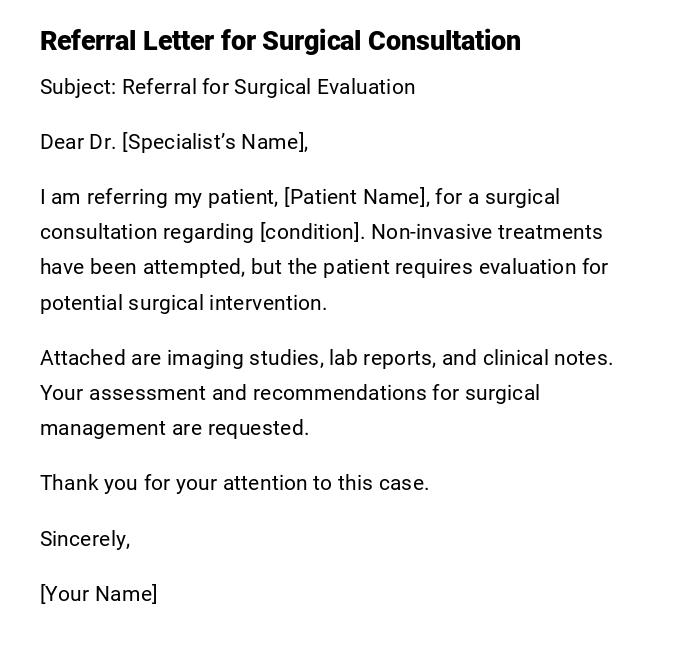

 Download Word Doc
Download Word Doc
 Download PDF
Download PDF